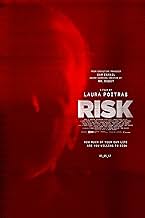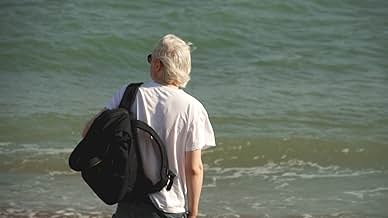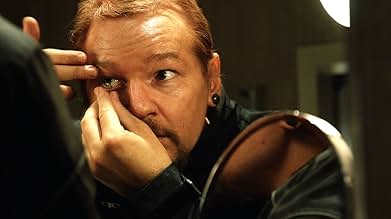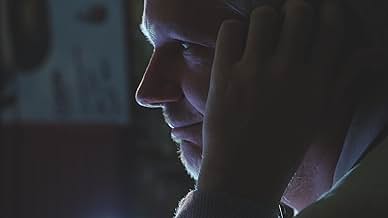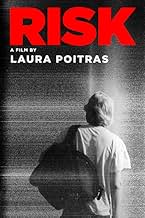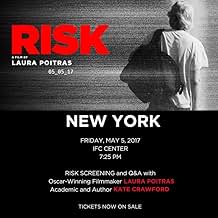IMDb RATING
6.3/10
2.4K
YOUR RATING
The story of WikiLeak's editor-in-chief Julian Assange as seen by documentary filmmaker Laura Poitras.The story of WikiLeak's editor-in-chief Julian Assange as seen by documentary filmmaker Laura Poitras.The story of WikiLeak's editor-in-chief Julian Assange as seen by documentary filmmaker Laura Poitras.
- Director
- Writers
- Stars
- Awards
- 4 nominations total
Laura Poitras
- Self
- (voice)
Louis Bladel
- Self - FBI counterintelligence
- (as Special Agent Louis Bladel)
Hillary Clinton
- Self
- (archive footage)
James Comey
- Self
- (archive footage)
Anderson Cooper
- Self
- (archive sound)
- Director
- Writers
- All cast & crew
- Production, box office & more at IMDbPro
Featured reviews
"We don't have a problem, you have a problem." Julian Assange
As the ever-cool Assange announces to Hillary's campaign that leaks are forthcoming, he is slightly wrong: No one in the WikiLeaks world, on either side, is without problems. For Assange, four years of asylum-imprisonment in the London Ecuador embassy could not be easy; for Hillary, leaked messages and her private use of a server are only the beginnings of her problems.
It's all about info and who commands it—Laura Poitras's doc, Risk, lets us in to the private world of the Australian journalist and programmer Assange, founder of WikiLeaks in 2006, enabler of Robert Snowden, and purveyor of thousands of pages of secret government documents.
Poitras does a remarkable job keeping above the political sides, even admitting at one point that she does not trust Assange. She makes her presence known from voice over, yet rarely pushes an agenda other than entertaining and enlightening her audience.
Poitras gives the audience as much insight as they could hope for with a subject as opaque as might be expected: "What does it matter how I feel?" (Assange) Brief moments with Lady Gaga and Daniel Ellsberg provide humorous respite from the monotony of Assange's imprisonment.
Assange's answer as to why he does WikiLeaks is as evasive as his answers to most questions. Deflecting accusations of sexual harassment is pure Assange: He gently accuses hardcore feminists of a conspiracy against him. Sweden still wants to interview him about the charges.
Whereas in Citizenfour, Poitras let Snowden come off as a hero, she does not cut the low-key Risk in a way to make Assange saintly: "The risk of inaction is extremely high," he says in a reflection of his activist mentality and the title of the film.
He is smooth and careful, partly right and partly wrong, just like this documentary.
As the ever-cool Assange announces to Hillary's campaign that leaks are forthcoming, he is slightly wrong: No one in the WikiLeaks world, on either side, is without problems. For Assange, four years of asylum-imprisonment in the London Ecuador embassy could not be easy; for Hillary, leaked messages and her private use of a server are only the beginnings of her problems.
It's all about info and who commands it—Laura Poitras's doc, Risk, lets us in to the private world of the Australian journalist and programmer Assange, founder of WikiLeaks in 2006, enabler of Robert Snowden, and purveyor of thousands of pages of secret government documents.
Poitras does a remarkable job keeping above the political sides, even admitting at one point that she does not trust Assange. She makes her presence known from voice over, yet rarely pushes an agenda other than entertaining and enlightening her audience.
Poitras gives the audience as much insight as they could hope for with a subject as opaque as might be expected: "What does it matter how I feel?" (Assange) Brief moments with Lady Gaga and Daniel Ellsberg provide humorous respite from the monotony of Assange's imprisonment.
Assange's answer as to why he does WikiLeaks is as evasive as his answers to most questions. Deflecting accusations of sexual harassment is pure Assange: He gently accuses hardcore feminists of a conspiracy against him. Sweden still wants to interview him about the charges.
Whereas in Citizenfour, Poitras let Snowden come off as a hero, she does not cut the low-key Risk in a way to make Assange saintly: "The risk of inaction is extremely high," he says in a reflection of his activist mentality and the title of the film.
He is smooth and careful, partly right and partly wrong, just like this documentary.
Preferring to find a movie on what the theme is and liking more imported foreign films and documentaries than those made in prolific USA, here the main person and the well-known 'Wikileaks' was an instant click, so had to go and see & learn more than mass media informs us about Julian Assange. And this writer was totally fascinated and involved throughout entire film.
While Poitras' personal inserted comments came in - but voiced more quietly,volume down- we had to attended more to hear and absorb these inserts. We needed to hear these added, helpful information bits to the scenes portrayed.
Assange was mostly seen in close-ups, so his every impartially-held facial expression could still not be easily read. But some good glimpses of his attitude were revealed anyhow. He hid some when filmed, even while talking lots, and he sometimes droned on ....so when his words were mumbled / hummed Assange was heard less. So while he was carefully conveying some info in his not-subtle ways, at times he left this writer confused, as when he refused to give direct answers to clear questions asked in film.
His female associates were not identified if in what kind of 'relationship' to Julian, or what their expertise was.... other than being always there, supportive, helping him groom or make escapes. That women were always in the " rescuer" roles left the impression that they may be & still are attracted to Julian as "hero", and thus to do the usual 'woman's work' only. As only assistants ?
Their other values, whatever they are, were not clarified nor appreciated either. Julian's mother, also included in such roles, was seen as only-adjunct helper. Can this be so ?
But other scenes showed Julian more actually responding to his circumstances -which is mostly well known & displayed in ordinary TV news clips.
His complaints - while living well - and while limited to living in only 1 fancy embassy- bldg seemed petulant and childish, as he refused to admit responsibility to eliciting the 'unexpected unwanted consequences' to his work . His own actions affected many political people, who still want to censor and punish any 'whistle-blowers', including but not just Assange.
Wikileaks has emerged as a very influential media platform source and as a threat to those who prefer their secrets kept away from the many people the actions do affect, kill, and distort . Many lives may have been/ are still changed from their exposures, as noted even in the most recent / now current events.
To learn more about the main man, tho not the only 1, who still holds dominance on the organization is very relevant and important to us all = the viewers and citizens of these media-blitzed and news-censored worlds. Tho film was a bit long, but still held the viewers' full attention,no one walked out.
This is a must-see film to those who want to better understand the man who helps still now reveal" what is happening " behind many locked 'confidential' doors/ documents &emails. Those are, perhaps, more real than what is exposed as governments' workings elsewhere. " Risk" is not a risk but a must-also-see-this-film.... for anyone watching daily propagandized & commercialized & censored news anywhere.
While Poitras' personal inserted comments came in - but voiced more quietly,volume down- we had to attended more to hear and absorb these inserts. We needed to hear these added, helpful information bits to the scenes portrayed.
Assange was mostly seen in close-ups, so his every impartially-held facial expression could still not be easily read. But some good glimpses of his attitude were revealed anyhow. He hid some when filmed, even while talking lots, and he sometimes droned on ....so when his words were mumbled / hummed Assange was heard less. So while he was carefully conveying some info in his not-subtle ways, at times he left this writer confused, as when he refused to give direct answers to clear questions asked in film.
His female associates were not identified if in what kind of 'relationship' to Julian, or what their expertise was.... other than being always there, supportive, helping him groom or make escapes. That women were always in the " rescuer" roles left the impression that they may be & still are attracted to Julian as "hero", and thus to do the usual 'woman's work' only. As only assistants ?
Their other values, whatever they are, were not clarified nor appreciated either. Julian's mother, also included in such roles, was seen as only-adjunct helper. Can this be so ?
But other scenes showed Julian more actually responding to his circumstances -which is mostly well known & displayed in ordinary TV news clips.
His complaints - while living well - and while limited to living in only 1 fancy embassy- bldg seemed petulant and childish, as he refused to admit responsibility to eliciting the 'unexpected unwanted consequences' to his work . His own actions affected many political people, who still want to censor and punish any 'whistle-blowers', including but not just Assange.
Wikileaks has emerged as a very influential media platform source and as a threat to those who prefer their secrets kept away from the many people the actions do affect, kill, and distort . Many lives may have been/ are still changed from their exposures, as noted even in the most recent / now current events.
To learn more about the main man, tho not the only 1, who still holds dominance on the organization is very relevant and important to us all = the viewers and citizens of these media-blitzed and news-censored worlds. Tho film was a bit long, but still held the viewers' full attention,no one walked out.
This is a must-see film to those who want to better understand the man who helps still now reveal" what is happening " behind many locked 'confidential' doors/ documents &emails. Those are, perhaps, more real than what is exposed as governments' workings elsewhere. " Risk" is not a risk but a must-also-see-this-film.... for anyone watching daily propagandized & commercialized & censored news anywhere.
The ability of whistle-blowers to leak sensitive, and even secret, information is an essential check on the potential abuse of power by government. But Julain Assange, founder of Wikileaks, a website established to assist such whistle-blowers, is a deeply problematic figure: an egoist who falls out with his own collaborators with amazing frequency; a man who seemed hardly to take accusations of rape seriously; an instinctive anarchist who sometimes seems to be fighting not government tyranny everywhere, but exclusively in America. This documentary was conceived as a friendly venture (in fact, the film-maker quietly reveals she is not exactly a neutral party in the story), but the essential vanity of Assange is clearly on display. Ultimately, it's hard to avoid concluding that whatever good Wikileaks might have done has been fatally compromised by the man at its core.
The reviews for this documentary are all over the place. Reviewers who are firm advocates of WikiLeaks tend to over-exaggerate the film's virtues, while those who find the organization's actions reprehensible tend to hate it. I watched the film as an objective reviewer.
Some have called the film a sleeper and there are parts of the film that live up to that branding. These occur mainly at the beginning of the film when scenes shift quickly and conversations are somewhat baffling and vapid.
Assange emerges as an emotionally remote character who hides his true personality behind his dedication to WikiLeaks. He even states that what he does is more important than who he is. The only scene in which we get a glimpse into his repressed character is when he is interviewed by Lady Gaga, dressed in her Wicked-Witch-of-the West costume. Ms. Gaga, like most celebrities, tries to hide her insecurity behind false bravado and seemingly unfiltered, carefree questions which tell us more about her than Assange. In a clear case of projection, she asks about his relationship to his parents, wherein Assange claimed his father was "abstract".
We do get some glimpses into the life Assange lives within the Ecuadorean Embassy. We learn about his relationships with his team and find out a few ways that the organization keeps itself protected from government intrusion. This may hold some interest for some viewers.
The latter half of the film is more interesting, especially when he talks about the DNC hacking. I only wish this were expanded more as it is more timely. It is at this point in the film that Assange talks about the earth as so interconnected that any action must be considered a global action. It is an interesting an important viewpoint that should be considered. It is not simply "think globally, act locally". It is more that even a small local action may have global implications.
The film leaves many questions unanswered and, as a whole, doesn't flow very well. It could have been better made. There is nothing compelling in it, meaning that a viewer may be tempted to stop watching the film entirely at certain points. There is no hook that makes us want to see how it ends. There are no compelling relationships and some issues seem unresolved that could easily have been. Still, a few scenes are definitely worth seeing.
For those interested in the world of cyber security, political intrigue, and government surveillance, this documentary may be of interest. For the general public, however, it may simply be too dull.
Some have called the film a sleeper and there are parts of the film that live up to that branding. These occur mainly at the beginning of the film when scenes shift quickly and conversations are somewhat baffling and vapid.
Assange emerges as an emotionally remote character who hides his true personality behind his dedication to WikiLeaks. He even states that what he does is more important than who he is. The only scene in which we get a glimpse into his repressed character is when he is interviewed by Lady Gaga, dressed in her Wicked-Witch-of-the West costume. Ms. Gaga, like most celebrities, tries to hide her insecurity behind false bravado and seemingly unfiltered, carefree questions which tell us more about her than Assange. In a clear case of projection, she asks about his relationship to his parents, wherein Assange claimed his father was "abstract".
We do get some glimpses into the life Assange lives within the Ecuadorean Embassy. We learn about his relationships with his team and find out a few ways that the organization keeps itself protected from government intrusion. This may hold some interest for some viewers.
The latter half of the film is more interesting, especially when he talks about the DNC hacking. I only wish this were expanded more as it is more timely. It is at this point in the film that Assange talks about the earth as so interconnected that any action must be considered a global action. It is an interesting an important viewpoint that should be considered. It is not simply "think globally, act locally". It is more that even a small local action may have global implications.
The film leaves many questions unanswered and, as a whole, doesn't flow very well. It could have been better made. There is nothing compelling in it, meaning that a viewer may be tempted to stop watching the film entirely at certain points. There is no hook that makes us want to see how it ends. There are no compelling relationships and some issues seem unresolved that could easily have been. Still, a few scenes are definitely worth seeing.
For those interested in the world of cyber security, political intrigue, and government surveillance, this documentary may be of interest. For the general public, however, it may simply be too dull.
I watched the newest cut of Risk as of 5/7/17 with the director in attendance.
I went into Risk blind, as in, I had no prior knowledge of the film prior to seeing it. I was already a big fan personally Poitras' previous Oscar-winning documentary CITEZENFOUR, so I was expecting to get something similar in that sense, but what I got was something even more provocative. The viewer throughout the film is creating this image of Assange as more and more things come into light. At the same time, we get an in-depth look into the inner operations and daily struggle of one of the most famous/infamous, depending who you're asking, online warehouse of classified documents, WikiLeaks. This clash of truth, privacy, and freedom is experienced as the governments of the world begin question each others practices while also witnessing the personal struggle and persecution of the whistle-blowing community. All that, as told through the perspective of a documentary film-maker who puts so much at risk personally to capture the truth of everything that happens in this community that I personally have no extensive knowledge on. About Assange, the viewer is really left to observe this candid portrayal of the man behind the whole operation. A portrayal that even the subject doesn't agree with. That, along with the fact that we are living immediate consequences of the the events portrayed in the film, is what makes it so raw and so relevant to what we're living through right now.
I went into Risk blind, as in, I had no prior knowledge of the film prior to seeing it. I was already a big fan personally Poitras' previous Oscar-winning documentary CITEZENFOUR, so I was expecting to get something similar in that sense, but what I got was something even more provocative. The viewer throughout the film is creating this image of Assange as more and more things come into light. At the same time, we get an in-depth look into the inner operations and daily struggle of one of the most famous/infamous, depending who you're asking, online warehouse of classified documents, WikiLeaks. This clash of truth, privacy, and freedom is experienced as the governments of the world begin question each others practices while also witnessing the personal struggle and persecution of the whistle-blowing community. All that, as told through the perspective of a documentary film-maker who puts so much at risk personally to capture the truth of everything that happens in this community that I personally have no extensive knowledge on. About Assange, the viewer is really left to observe this candid portrayal of the man behind the whole operation. A portrayal that even the subject doesn't agree with. That, along with the fact that we are living immediate consequences of the the events portrayed in the film, is what makes it so raw and so relevant to what we're living through right now.
Did you know
- TriviaThe WikiLeaks lawyers Margaret Ratner Kunstler, Deborah Hrbek, Renata Avila and Melinda Taylor published an 'opinion piece' in Newsweek on May 17, 2017; WikiLeaks announced on the same day on Twitter that they may sue Laura Poitras: "We are lawyers for WikiLeaks. We are speaking out because we believe that Laura Poitras's film Risk (2016), released in U.S. theaters on May 5 this year, places our clients in legal jeopardy. (...) Our first issue with "Risk" is that the film was edited in New York, where the raw footage can more easily be seized by the U.S. government. By moving the editing location from Berlin to the U.S., Poitras has endangered our clients and reneged on written agreements with WikiLeaks that explicitly forbid her from editing the footage in the United States. (...) Poitras has also violated her unambiguous promise to the subjects of the film that they would have an opportunity to review the film in advance and request changes, and that they could decline to appear if they or their lawyers felt that the movie put them at risk. Had the filmmaker not agreed to these express conditions, WikiLeaks' staff would not have allowed themselves to be filmed in the first place. Despite repeated requests, neither the subjects of the film nor their attorneys were granted a prior viewing of the film that Poitras intended to release in the U.S.. When, along with the general public, we were finally able to view "Risk", we were dismayed to discover that the film released in theaters is a different version, not only from that which premiered at Cannes the year before, but also from the version screened for Julian Assange and his UK counsel at the Ecuadorian Embassy in London. The film viewed in the Embassy just one month prior to its U.S. release was shorn of all narration and omitted numerous new scenes, significantly changing its tenor. That the 'real' film contained these elements was concealed, preventing Assange from exercising his contractual rights. Prior to its initial U.S. release, seven of the participants submitted non-consent forms to the producers advising Poitras and her team that they did not want to appear in the film. Regardless, Poitras went ahead and released it. (...) To convince the audience of her point about the prevalence of sexism, Poitras has marginalized and demeaned a number of women who work for WikiLeaks, choosing instead to give men most of the airtime and leaving scenes depicting the significant contributions of the women WikiLeaks journalists on the cutting room floor. In their place, we now see an intense focus on women taking instructions and throwing off adoring looks. Sarah Harrison, for example, a brilliant journalist and winner of the Willy Brandt prize for "exceptional political courage," who at considerable personal risk helped Edward Snowden obtain political asylum, and who was accurately portrayed as having a central role in WikiLeaks work in the Cannes version, is now depicted as little more than a minion. Exactly what caused this pivot is not entirely clear. (...) The reason for the shift seems to be contained in the newly added voiceover, in which Poitras divulges that she was involved in an intimate relationship with one of the film's primary subjects, award-winning journalist Jacob Appelbaum. Appelbaum appears prominently in Poitras' Citizenfour (2014) as well as in "Risk". Although he does not work for WikiLeaks, Poitras conflates WikiLeaks with the organization he did work for, Tor, and makes him a central focus of the current version of "Risk". The Cannes premiere of "Risk" portrayed Appelbaum in a flattering light and Poitras did not disclose the nature of their relationship at that time. (...) Poitras was criticized after Cannes for appearing to be overly sympathetic to WikiLeaks. Instead of providing us with a more objective portrayal of her subject matter, she has re-framed her story to turn "Risk" into a film by Laura Poitras about Laura Poitras; a rather late coming-of-age story about the filmmaker discovering that there is sexism in her social and professional circles. Instead of a documentary about the abuse of state power and WikiLeaks' important role in exposing it, the emphasis of the film is now to highlight hotly disputed claims about an ex-boyfriend. We have to ask: Why choose this moment in history, when First Amendment and other fundamental rights are under attack, to undermine the credibility of an organization dedicated to government transparency and freedom of the press? (...) "Risk" might win attention for Poitras by pandering to tabloid narratives about its subjects, but it has done a great disservice to her fellow documentarians, and has profoundly betrayed her friends, her colleagues and her journalistic integrity."
- Quotes
Julian Assange: We don't have a problem, you have a problem.
- ConnectionsFeatures Collateral Murder (2010)
- How long is Risk?Powered by Alexa
Details
- Release date
- Countries of origin
- Official sites
- Languages
- Also known as
- Риск
- Filming locations
- Production companies
- See more company credits at IMDbPro
Box office
- Gross US & Canada
- $200,219
- Opening weekend US & Canada
- $76,327
- May 7, 2017
- Gross worldwide
- $214,669
Contribute to this page
Suggest an edit or add missing content




